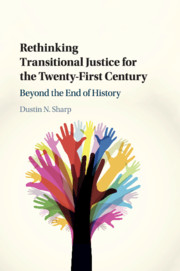Book contents
- Rethinking Transitional Justice for the Twenty-First Century
- Rethinking Transitional Justice for the Twenty-First Century
- Copyright page
- Contents
- Preface
- Acknowledgments
- 1 Introduction
- Part I Transitional Justice Peripheries
- Part II Building a Better Foundation
- 5 Peacebuilding and Liberal Postconflict Governance
- 6 Transitional Justice and Liberal International Peacebuilding
- 7 Toward a More Emancipatory Foundation for Transitional Justice
- 8 Conclusion
- Bibliography
- Index
8 - Conclusion
After the End of History, What Should Transitional Justice Become?
from Part II - Building a Better Foundation
Published online by Cambridge University Press: 23 February 2018
- Rethinking Transitional Justice for the Twenty-First Century
- Rethinking Transitional Justice for the Twenty-First Century
- Copyright page
- Contents
- Preface
- Acknowledgments
- 1 Introduction
- Part I Transitional Justice Peripheries
- Part II Building a Better Foundation
- 5 Peacebuilding and Liberal Postconflict Governance
- 6 Transitional Justice and Liberal International Peacebuilding
- 7 Toward a More Emancipatory Foundation for Transitional Justice
- 8 Conclusion
- Bibliography
- Index
Summary
- Type
- Chapter
- Information
- Rethinking Transitional Justice for the Twenty-First CenturyBeyond the End of History, pp. 155 - 166Publisher: Cambridge University PressPrint publication year: 2018



